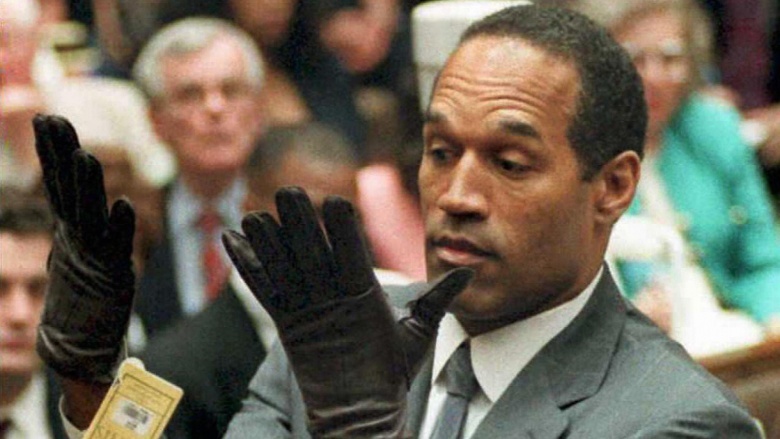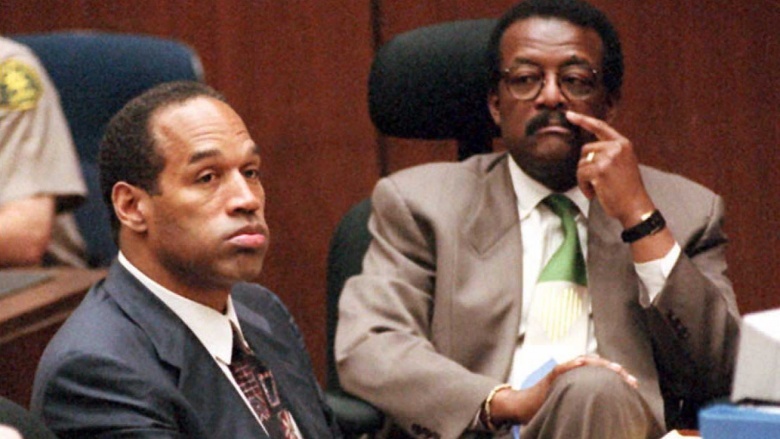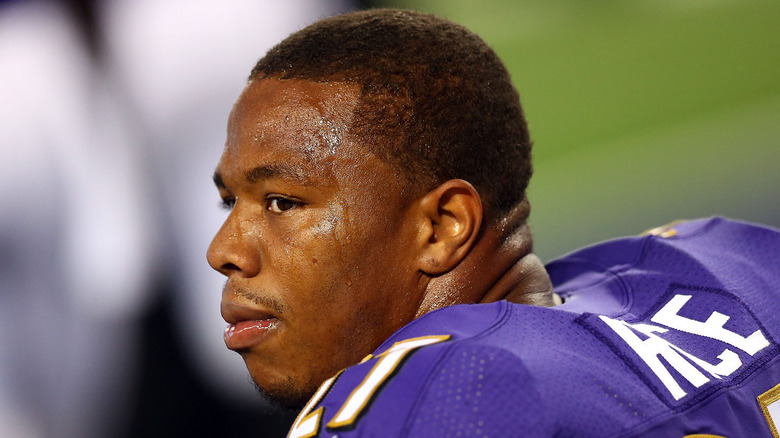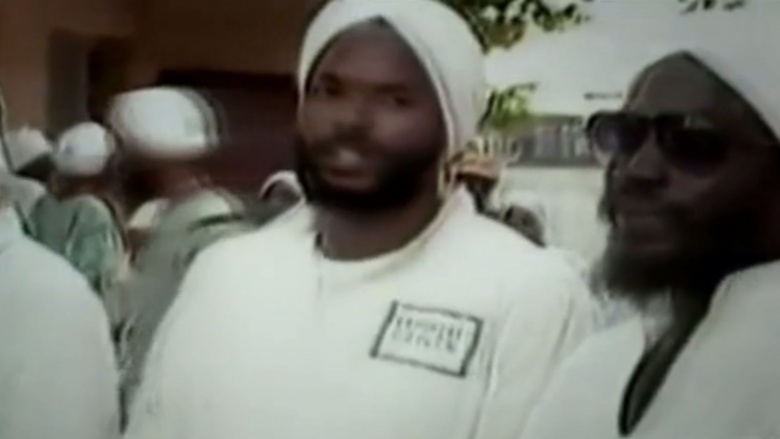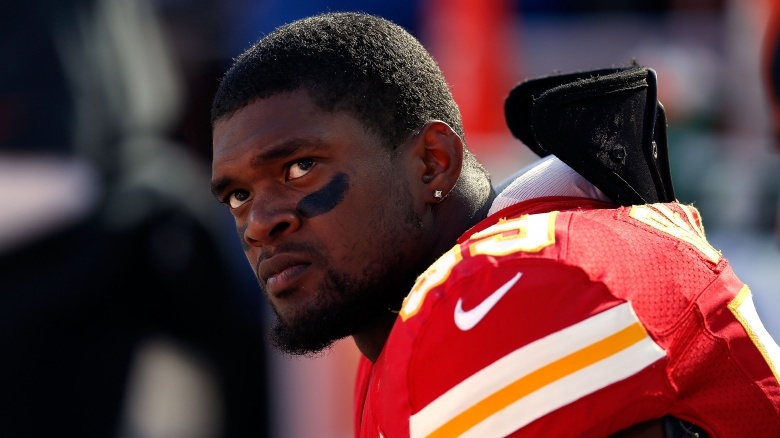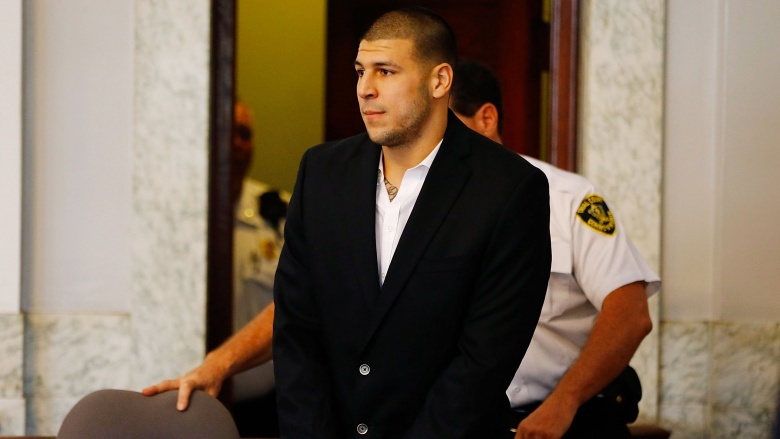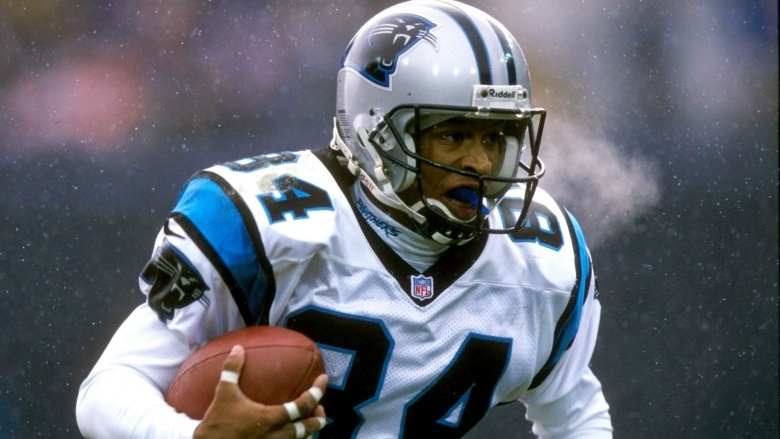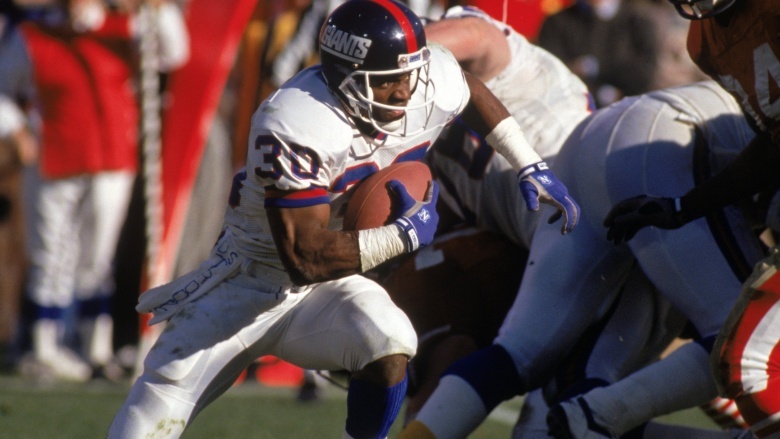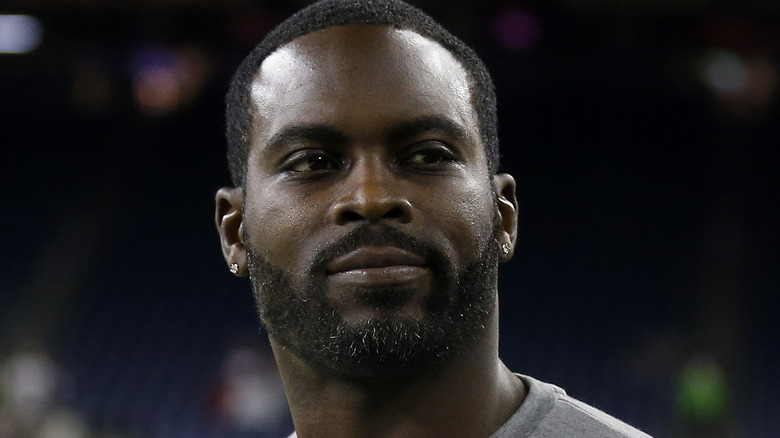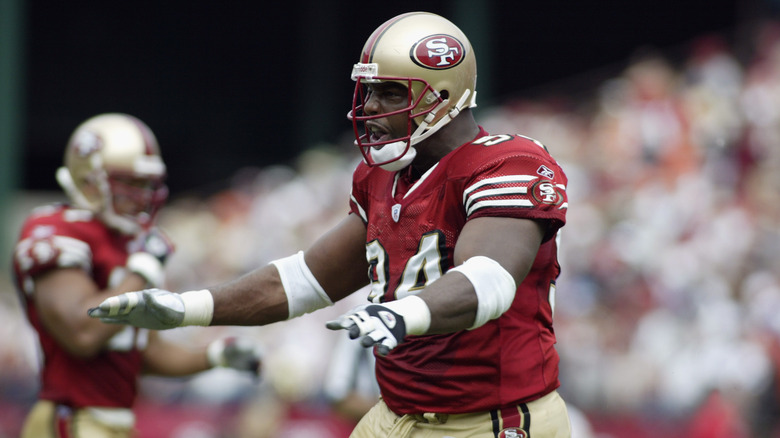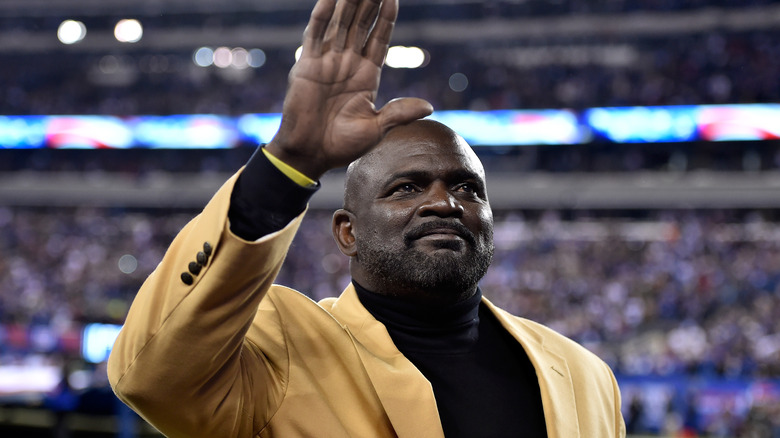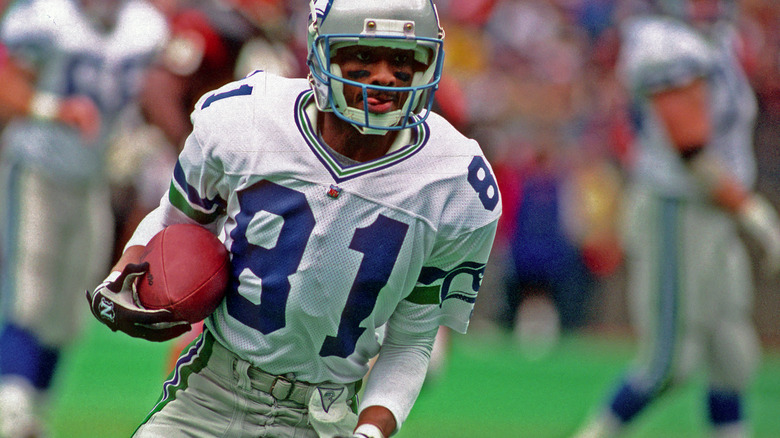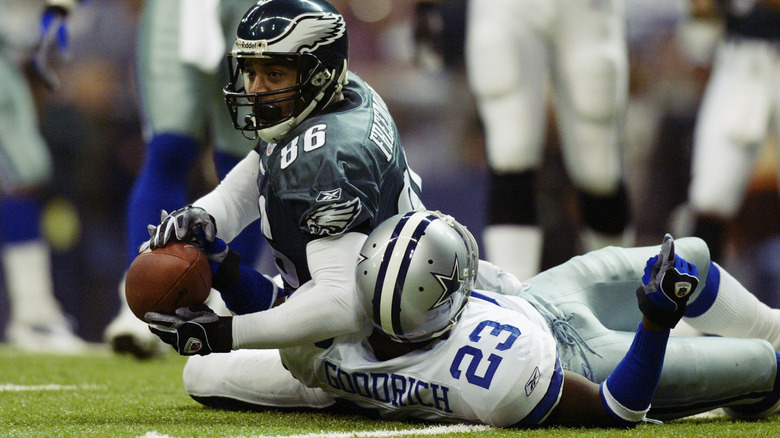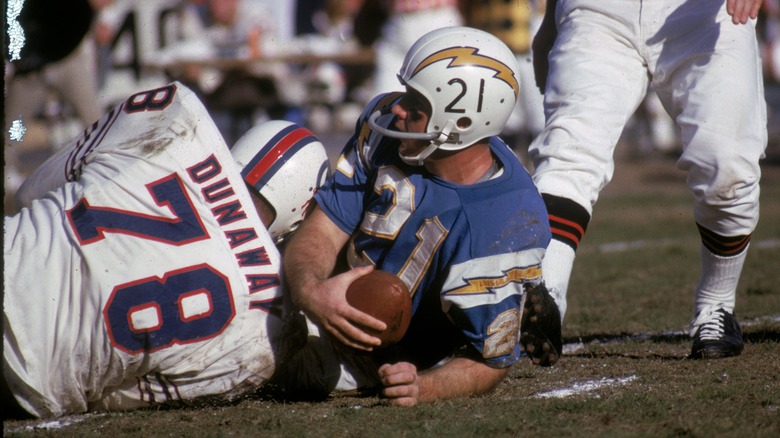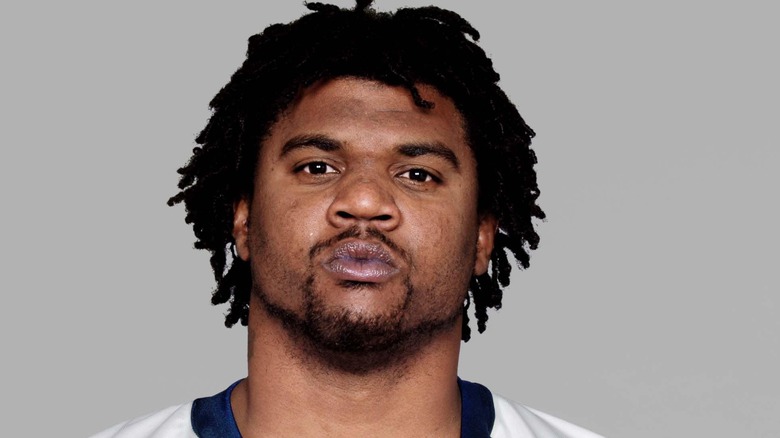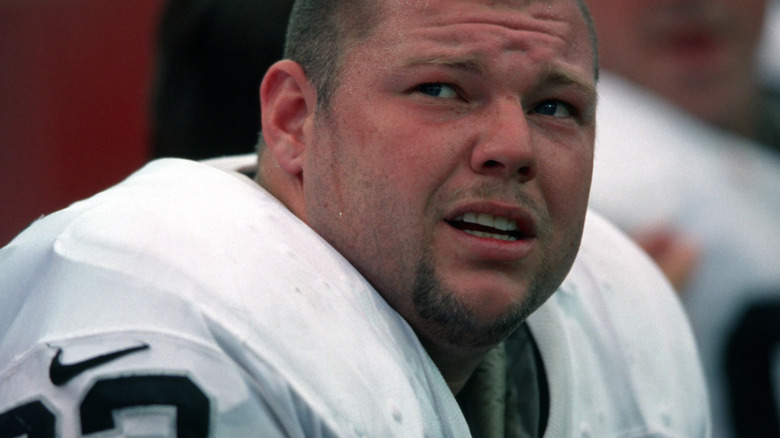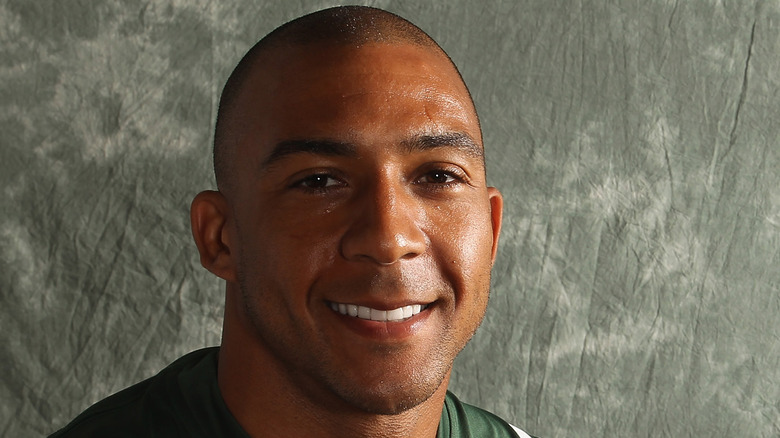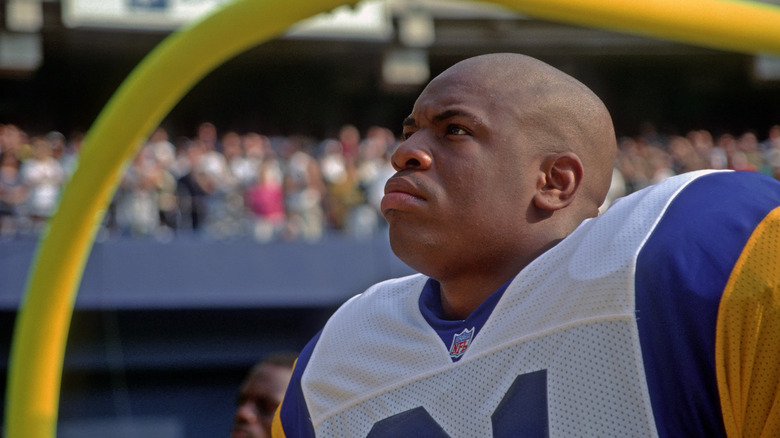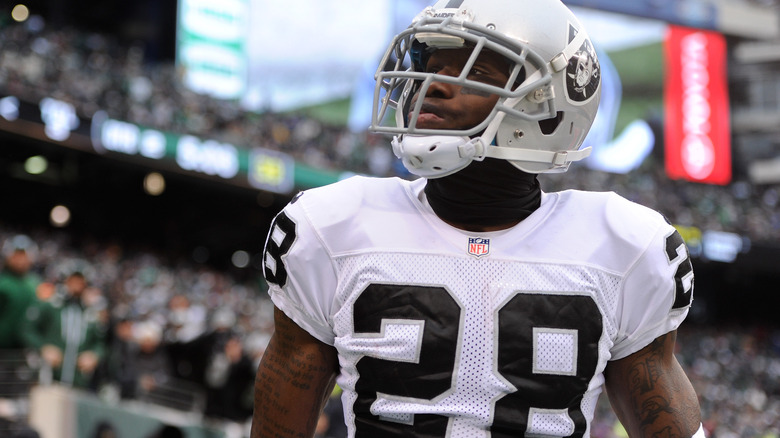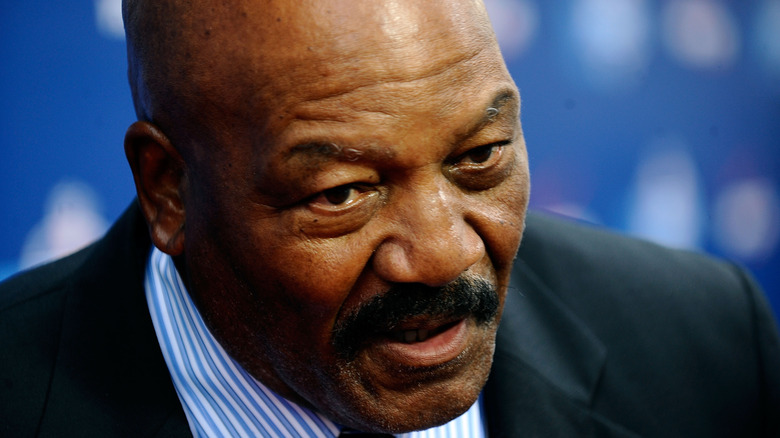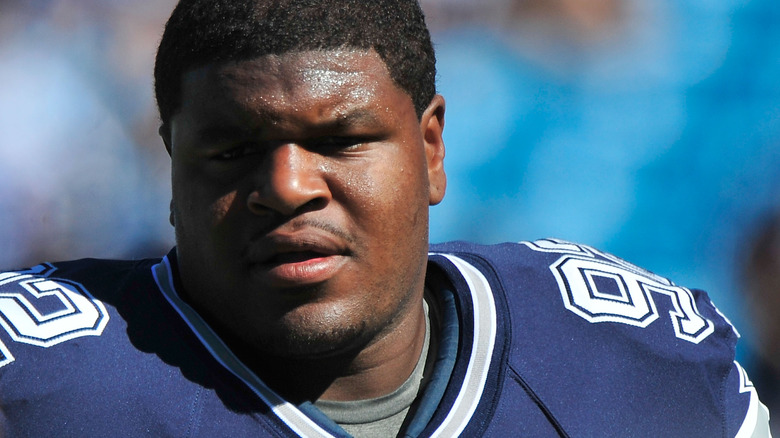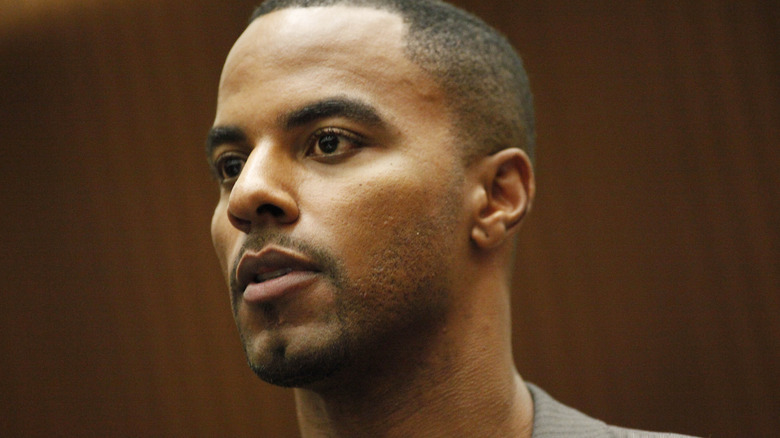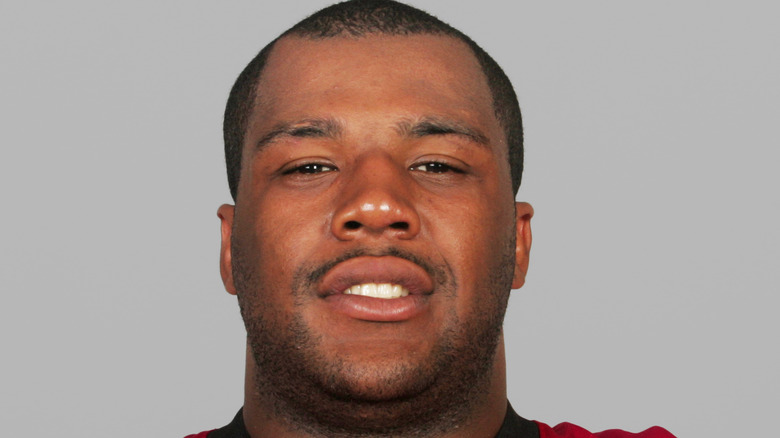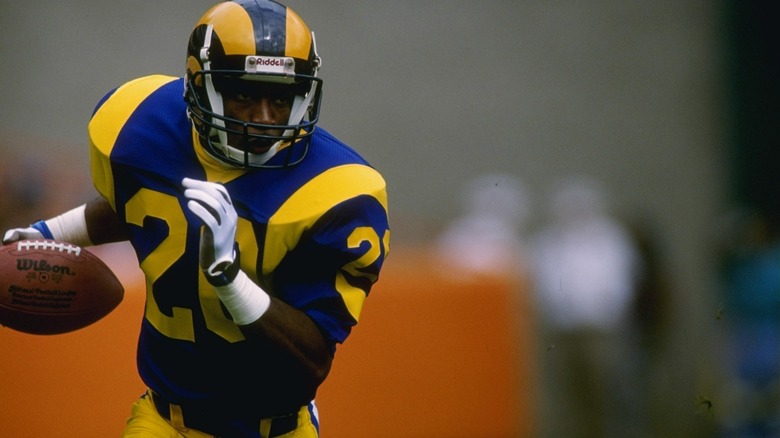Worst Crimes Committed By NFL Players
There's just an endless fascination with professional athletes, many of whom have been elevated to celebrity status through their feats on and off the field. The media circus that surrounded O.J. Simpson's 1995 trial for the murder of his ex-wife Nicole Brown Simpson set the stage for fans to watch such falls from grace. To think that an NFL superstar like Simpson could (allegedly) be a cold blooded killer is mind boggling.
But you know what's even harder to understand? Simpson isn't the only NFL player accused of committing a terrible crime. Not even close. In fact, history is littered with cases of football stars who seemed to have everything, only to go completely off the rails. Here's a sad and shocking look at the worst crimes committed by NFL players.
O.J. Simpson
It might be hard for younger generations to understand now, but once upon a time O.J. Simpson was not only a world famous and beloved NFL superstar but also an icon of both television and film. A high profile pitchman for companies like Hertz, as well as a commentator on "Monday Night Football," Simpson also had a successful movie career in films like "The Towering Inferno," and most famously the "Naked Gun" trilogy. It's not a stretch to say he was beloved by millions.
That's what made it all the more shocking and terrible when he was accused of cold-bloodedly murdering both his ex-wife Nicole Brown Simpson and her friend Ronald Goldman in 1994. Despite overwhelming evidence, including DNA from blood samples found in Simpson's car and home, he was acquitted by a jury, as per History, in one of the most publicized trials in American history. Universally believed to be guilty, Simpson was eventually sent to prison on unrelated charges and was sentence to 33 years. He was released in 2017. Justice? You decide.
Ray Rice
If there's any NFL case nearly as infamous as the O.J. Simpson murder trial, it's Ray Rice's assault on his then-fiance Janay Palmer. And make no mistake, there was nothing "domestic" about this assault. It was a vicious, sadistic attack that would have likely gone unnoticed and nearly unpunished if the NFL and the Baltimore Ravens had anything to say about it. Unfortunately for Rice, though, the brutal punch he delivered to Palmer's face in 2014 — instantly knocking her out cold — and his subsequent total disregard for her well-being were both caught on film.
Though the NFL and the Ravens attempted to cover things up and smooth them over in the holy name of sacred football, TMZ leaked the recording. Public outcry led to Rice being cut and blacklisted from the sport and to a national discussion of domestic violence in and out of sport, as per the Baltimore Sun. Since the incident, Rice has become a spokesperson against domestic violence, working with rookie athletes and other teams to create awareness, as per the NFL.
Robert Rozier
Defensive end Robert Rozier isn't a household name like O.J. Simpson or Ray Rice, but in 1979 he was drafted by the St. Louis Cardinals, according to Sportscasting. Despite being a ninth round pick, Rozier rose quickly on the depth chart and played in six games to start the 1979 season. But before his career could take off, he was released due to drug use (via KTAR), and a downward spiral began, culminating in a series of bizarre murders that would reveal Rozier to be nothing short of a serial killer.
After bouncing around the Canadian Football League, Rozier joined a black supremacist cult called The Brotherhood that required its members to prove their allegiance by murdering white people and bringing back body parts as trophies. Rozier went on a sick killing spree, murdering seven people over the course of 1985 and 1986. After turning state's evidence against the cult, though, he got off with a just a 10-year sentence and placement in the witness protection program. But after being caught passing bad checks in 1999, Rozier was sent back to jail — this time for life. Justice delayed is still justice served.
Jovan Belcher
An undrafted free agent, linebacker Jovan Belcher was signed by the Kansas City Chiefs in 2009 and went on to become a regular contributor on defense for the next three seasons. But while his career on the field was going well, off the field things weren't so good, as he and his girlfriend Kasandra Perkins frequently squabbled, especially over the care of their newborn daughter Zoey.
As USA Today details, on the morning on December 1, 2012, Belcher arrived home after a long night of drinking. Belcher pulled out a gun and murdered Perkins, with his own mother in a nearby room, who was helping take care of the baby. After shooting Perkins several times, Belcher drove to the Chiefs practice facility and confronted the team's general manager, Scott Pioli, and head coach, Romeo Crennel. Pioli and Crennel attempted to convince Perkins to put his gun down and turn himself in. But instead Belcher fatally shot himself in the head in front of them. Perkins was 22 when she was murdered. Their daughter Zoey became an orphan at just three months old.
Aaron Hernandez
As a star tight end for the New England Patriots, Aaron Hernandez seemed to be living the dream. Playing opposite Rob Gronkowski and alongside legendary quarterback Tom Brady, Hernandez and the Patriots were poised for years of offensive dominance. But Hernandez harbored a dark secret that would derail his career and life: He was a murderer.
According to Sportscasting, semi-pro football player Odin Lloyd was murdered on the night of June 17, 2013. Evidence linked Hernandez to the shooting, and in 2015, he was found guilty and sentenced to life in prison. The investigation also turned up evidence incriminating Hernandez in the July 16, 2012, murders of Daniel Jorge Correia de Abreu and Safiro Teixeira Furtado; Hernandez was indicted on double murder charges but was later acquitted. He has also been linked to two other shooting incidents in Florida, in 2007 and 2013. Hernandez won't be shooting anyone else, though. In April 2017, he took his own life in prison.
Rae Carruth
A first round draft pick of the Carolina Panthers in 1997, receiver Rae Carruth was on track to become a superstar when his career was suddenly derailed partway through the 1999 season. The reason? He was sent to jail for the heinous crime of assassinating his pregnant ex-girlfriend in a cold blooded, carefully orchestrated hit.
It happened on the night of November 16, 1999, in Charlotte, North Carolina. As the Charlotte Observer details, Cherica Adams, a local real estate agent, was then eight months pregnant with Carruth's child. Carruth hired a nightclub heavy named Van Brett Watkins to be the trigger man, while Carruth blocked Adams' vehicle with his car so she couldn't get away. But there was a hitch: After being shot, Adams survived long enough to call 911 and identify Carruth as the killer. She then died of her wounds, though doctors were miraculously able to save the baby.
Carruth fled and was found hiding in a car trunk, as per the Los Angeles Times. He was given an 18-year prison sentence for conspiracy to commit murder and was released in 2018, as per Sportscasting.
Dave Meggett
With all the money and fame at their disposal, you'd think that NFL players would be able to pretty much get women whenever they want. But for some criminals, even that isn't enough, which might explain how New York Giants and New England Patriots star Dave Meggett — a 10-year veteran with two Pro Bowls and a Super Bowl ring to his name — ended up as a convicted serial rapist.
As SB Nation details, first charged in relation to a sex crime in 1990, Meggett was dogged with accusations and arrests throughout his playing career and beyond, including an arrest in 1997 for assaulting a sex worker, another assault charge in 2001, and yet another in 2006. In fact, Meggett was arrested on assault, solicitation, or rape charges no fewer than seven times, getting off with probation or settling out of court on each occasion. Until the last, that is; in 2010, he was finally found guilty of rape and sentenced to 30 years in prison, as per ESPN.
Michael Vick
At the time of Michael Vick's fall from grace, History says that he was the NFL's highest-paid player. Law enforcement raided the home of the Atlanta Falcons' quarterback in April of 2007, and when the country learned what they found, they were horrified.
Law enforcement rescued dozens of pit bulls, who were forced to fight for Vick's so-called Bad Newz Kennels. Dogs that didn't make the cut as fighting dogs were drowned, hanged, or electrocuted, and Vick would later fail a polygraph test when asked about whether or not he had a hand in executing the dogs. In December of the same year, Vick was handed a 23-month sentence, and ESPN reported that the judge handed out more than the recommended sentence with this explanation: "You were instrumental in promoting, funding, and facilitating this cruel and inhumane sporting activity."
That was followed by a guilty plea and another three-year suspended sentence. He was released in May of 2009, welcomed back to the NFL two months later, and went to play for the Philadelphia Eagles. He retired in 2017.
The dogs of the Bad Newz Kennels went on to inspire. While Sports Illustrated says even organizations like PETA and the Humane Society claimed they were too damaged to be rehabilitated, Newsweek notes that of the 51 pit bulls rescued, 48 survived. Some lived out their days in a sanctuary, others were adopted as family pets. The last survivor — a dog named Frodo — passed away in 2021. He had spent 14 years being "pampered like a prince."
Dana Stubblefield
According to the Los Angeles Times, defensive lineman Dana Stubblefield had sort of an up-and-down career. Yes, he helped the San Francisco 49ers take home a Super Bowl win in '95, and yes, he was selected for the Pro Bowl three times and amassed some impressive awards, but he was also the first player named in the BALCO steroids scandal, pleading guilty in 2008.
Then, as the L.A. Times also details, in 2016, he was arrested for rape and false imprisonment. The victim was a developmentally disabled, 31-year-old woman Stubblefield had contacted through a babysitting service. The unidentified woman claimed that she had gone to his home looking for a job, and after a 20-minute meeting, said that Stubblefield had summoned her back with a text saying that he wanted to pay her for the meeting. She then said that was when he dragged her inside, assaulted her, then sent her on her way — with $80 for her trouble.
The woman immediately went to the police to report what had happened, and Stubblefield was arrested. Although CNN reports that Stubblefield and his defense team maintain his innocence, he was found guilty and, in October of 2020, was sentenced to 15 years in prison.
Lawrence Taylor
New York Giants linebacker Lawrence Taylor saw his problems starting early: According to The New York Times, he was once suspended by the NFL for drug and alcohol use. That was in 1988 — fast forward to 2010, and they were reporting that he had been arrested for solicitation and third-degree rape. The victim was 16 years old. Taylor ultimately plead guilty to sexual misconduct with a minor, and according to CNN, he was handed six years probation and a $2,000 fine — but that wasn't the end of the story.
In 2011, Taylor was back in court again. The once-unnamed victim had come forward and announced (via CBS) that she was going to be filing a civil suit against Taylor. The circumstances that led Christine Fierro to the hotel room that night were complicated, but her attorney summed them up like this: "She was not a prostitute, but was instead a child victim of sex trafficking."
The trial — the first in which a victim sued the "buyer of the illicit services" — was lined up to be a precedent-setting one. Then, in 2012, ESPN reported that the jury had found Taylor was not accountable for any part in trafficking. Taylor later explained, "... if I had known what was going on, I would have helped her."
Taylor was in headlines again in 2021, when Newsweek reported that he had turned himself in, then was arrested for violating the conditions of his status as a sex offender.
Tommy Kane
Tommy Kane was a wide receiver for the Seattle Seahawks from 1988 to 1992, and according to The Spokesman-Review, it was Nov. 30, 2003, when he attacked his wife. Witnesses said he first punched her and slammed her head against the floor, then stabbed her, while his mother and a friend had tried to stop him from hurting Tammara Shaikh, who had recently told him that she wanted a divorce.
Kane pleaded guilty to the killing, telling members of her family present at sentencing: "Please forgive me. I know you guys hate me, but I'm sorry." He was given an 18-year prison sentence, according to ESPN, which also reported he was back in court in 2010. His four children — who were between 3 and 9 years old when their mother was murdered — had been in the care of Shaikh's sister, who filed a civil lawsuit against him. They were awarded $590,000 by a judge who pointed out that Kane had used not one, but two different knives.
During his 2004 trial, Kane talked about his depression and his struggles with cocaine. He was ultimately day paroled in 2015, reports the The Montreal Gazette. In 2019, he was granted permission to participate in medical testing as a part of an NFL program to settle with players who had sustained permanent damage relating to concussions. He later admitted to relapsing into drug use, and according to The Montreal Gazette, he was once again arrested, then released on the condition he seek treatment for substance abuse.
Dwayne Goodrich
Dwayne Goodrich was drafted by the Dallas Cowboys in 2000, but it wasn't until 2002 that he played in his only game. He was first sidelined by injury, and then, by a tragedy of his own making. He had completely owned his actions, later saying (via ESPN), "The careless decision I made to take those young men's lives ... I can't take that back. They were out there trying to help others. I can try and do the same thing with the rest of my life, to make a positive difference."
He had spent a night drinking and club-hopping when he decided to drive, and it was on Dallas's Interstate 35 that he hit three people and killed two of them. The men were trying to pull an unconscious man from a burning car — the victim of another accident — when they were struck by Goodrich's BMW. He was ultimately arrested, found guilty of criminally negligent homicide with a deadly weapon, and was given a total sentence of almost 13 years in prison.
After being paroled in 2011, Goodrich returned to college to get a degree in criminal justice. He's also been active in speaking to groups — particularly sports teams — about the importance of the choices each person makes in their lives. He said, "I don't want to be known only as the Cowboys player that killed somebody. I want my story to have a different ending."
Jim Dunaway
It's worth noting right upfront that it's not entirely clear just what happened to Nonniel Dunaway, but according to the findings of a civil lawsuit filed against the ex-Dolphin and ex-Bill by his children in 2002, Jim Dunaway was found to be liable for her death.
Jim — who spent nine seasons playing for the Buffalo Bills before transferring to Miami and playing as a part of their Super Bowl-winning 1972 team — got divorced in 1995. According to Bleacher Report, his wife was awarded $1,800 per month, half of his pension, and 800 acres in property. Then, three years later, she died under incredibly mysterious circumstances.
In 1998, The Associated Press reported that she had been discovered in a pool. The Marion County coroner later found that she had suffered a severe skull fracture, and that she had been alive — but unconscious — "when she was placed in the water." Jim was arrested, charged, and taken before a grand jury, but was not indicted.
That wasn't the end of the story, though: Jim soon found himself in court again in 2002, this time, defending himself against a civil lawsuit filed by his own children. This time, he was found to be responsible, and his children were awarded around $500,000. The Columbian-Progress reported that Jim died in 2018, after being diagnosed with lung cancer.
Nate Webster
Nate Webster played in the NFL for nine years, says Fox, and he spent those seasons with the Bucs, the Bengals, and the Broncos. He was with the Bengals was he was arrested for what ABC Cincinnati says were "sex offenses against a Bengals coach's underage daughter."
According to court documents, Webster "repeatedly pressured the victim into sex 'by force or threat of force' for much of 2009. At the time, the victim was 15 years old, although Webster continuously claimed that she said she was 16, and therefore, the age of consent in Ohio.
Webster was convicted of unlawful sexual conduct with a minor in 2012, and was handed a 10-year sentence. That sentence would be cut short, when attorneys argued that the new focus on his faith — gained while in prison, with help from a former Bengal teammate-turned-pastor — made him a low risk as far as reoffending went. His wife also spoke on his behalf, and he was released in May of 2021.
Barret Robbins
According to NBC's Sports Uncovered, Barret Robbins — a center destined for the Pro Bowl — plunged into despair on the eve of Super Bowl XXXVII. Instead of preparing to join the Raiders on the field, he had headed to Tijuana and got blackout drunk. He made it back after being missing for 14 hours and was ultimately scrubbed from the game.
Fast forward to 2005, when the Los Angeles Times reported that the "strange spiral" Robbins had been caught up in had taken another turn. Robbins — who noted that he had been diagnosed as bipolar — had been released from the Raiders, arrested for allegedly assaulting a nightclub security guard, and then, CBS Miami reported that when South Beach police responded to a burglary in January of 2005, they found Robbins, hiding in the Playwright Irish Pub.
Robbins grabbed one officer and shoved him so hard it cracked his motorcycle helmet, and when he was unconscious, he knocked out another — after breaking his shoulder and teeth. The third officer fired five times, hitting Robbins twice in the chest — and that's when Robbins threatened to kill him.
Charges of attempted murder were lessened to probation and treatment programs, but that wasn't the end, either. He was rearrested on probation violations, sentenced to five years in prison in 2011 for drug offenses (via the NFL), was released in 2012 (via SI), and — according to Fox — was arrested several more times in 2020.
Kellen Winslow II
Football ran in the family of Kellen Winslow II — according to ESPN , his father was a Hall of Fame tight end who played with the Chargers, and the younger Winslow was drafted by the Browns before going on to play with the Bucs, Patriots, and Jets. The Pro Bowl tight end was once the NFL's highest-paid TE, and he retired in 2013.
In 2021, ESPN reported on charges of Winslow performing a lewd act in front of a 77-year-old woman, exposing himself to a 57-year-old neighbor, and the rape of a homeless woman. He was ultimately found guilty on those charges, but the jury couldn't reach a verdict on charges involving assaults on a 54-year-old hitchhiker and an unconscious 17-year-old. He ultimately pleaded guilty to the rape of the latter (an assault which occurred when he was 19 years old), and sexual battery of the former.
Winslow, says NBC, was also identified as being the man who broke into a California senior community — he was free on bail when one of the assaults occurred. He was condemned by the judge: "The vulnerability of the victims was no accident."
Winslow's defense argued that not only had he admitted to the crimes, but that he was suffering the symptoms of chronic traumatic encephalopathy, a degenerative condition that impacts the brain. He was still given a 14-year sentence.
Lawrence Phillips
Lawrence Phillips, says Newsweek, was a star of the University of Nebraska, and destined to be a star in the NFL. When he left college, he was already being called one of the best running backs to ever play, but by the time the 1996 draft rolled around, Phillips was already on shaky ground.
Phillips had started dating Kate McEwen in 1993, and according to the Associated Press, she filed a lawsuit against him in 1996. There were a slew of charges, including sexual assault, battery, false imprisonment, and kidnapping. Phillips was put on probation for a year and still signed on with the Rams as their first draft pick of the year.
Then, in 2005, Phillips had more charges filed against him, as per the Los Angeles Times. Then-girlfriend Amaliya Weisler accused him of choking her into unconsciousness in August, and then three weeks later, he was arrested for driving his car into a crowd of people he had accused of stealing his wallet.
No one was killed, but it still got him a slew of convictions and 10 years in jail. That and the assault on Weisler added up to 31 years of jail time, and in 2015, it looked like that could get even longer. That's when he found himself facing first-degree murder charges in the death of his cellmate, but he never went to trial: Phillips hanged himself in his cell, says CBS.
Phillip Adams
Phillip Adams spent six years in the NFL and played for six different teams. NPR says that after he left the NFL in 2015 and returned to his Rock Hill, South Carolina, home, those who knew him also knew that he was struggling to adjust to life without the game. The Guardian says it was only after his tragic death that anyone realized that he was struggling with something else.
In April of 2021, Phillip was identified as the gunman who opened fire at the Rock Hill home of a 70-year-old doctor named Robert Lesslie. Killed in the incident was Lesslie, his wife, their 9- and 5-year-old grandchildren, and two air conditioning technicians that had been working at the home when Phillip opened fire. After the shooting, he left the scene, returned to his home, where he died by suicide.
There was no connection between Adams and the victims, and Adams' father later suggested that the violent outburst had been the culmination of years of suffering. Alonzo Adams said that his son had suffered major head trauma while playing in the NFL, and an autopsy following his suicide revealed that his father was correct.
Phillip Adams was diagnosed as having been in stage 2 of chronic traumatic encephalopathy, which is associated with symptoms like aggression, paranoia, and depression. Doctors called his condition "unusually severe" (via The Guardian), and the Adams family later said that the NFL had declined all claims made, "due to his inability to remember things and to handle seemingly simple tasks, such as traveling ... to see doctors."
Jim Brown
As USA Today notes, Jim Brown is often called one of the best players to ever take the field, with surreal stats that still look surreal today — decades after his 1965 retirement. But along with those stats is an equally long list of crimes.
They started in 1965, when Brown found himself in court after an 18-year-old claimed that he had taken her to his motel room, given her whiskey, then proceeded to assault her. According to The New York Times, Brown said they had just talked, and he was found not guilty. Three years later, there were more accusations: This time, he was charged with assault with an intent to murder. The accuser — who had been thrown from a balcony — wouldn't name Brown directly, and the charges were dropped. He was, says CNN, fined $300 for hitting a deputy at the time of the incident.
There were more assault charges in 1969, and in 1971 (via USA Today): Again, charges were dropped. He beat up a golfer in 1978 — and served a single day in jail — then was back in court on charges of rape and assault in 1985. Those were dropped, too, just like the 1986 charges brought by a girlfriend who claimed he had beaten her after becoming convinced she was flirting with someone. Then, in 1999, it was his wife who brought charges against him, and he was ultimately given three years' probation. The following year, he was sentenced to six months in jail for refusing to fulfill some of the conditions of his probation — counseling — and served four months of the sentence, as per CNN.
In 2016, The Cleveland Browns erected a statue of him outside of their stadium.
Josh Brent
When ESPN reported on the conviction of Josh Brent, they called him the "former" Dallas Cowboys defensive tackle. He was on the team, though, in 2012, when he was driving the car that killed friend and teammate Jerry Brown.
Brent and Brown had been out partying that night, and during the trial, prosecutors said that Brent had consumed somewhere around 17 drinks that night. When he was tested after the crash, his blood alcohol content was about twice Texas's legal limit. Brent's defense argued that the tests were wrong, but video evidence — including police dash cam footage and footage of Brent holding multiple bottles of champagne — suggested differently. The jury thought so and found him guilty of intoxication manslaughter.
Brent was driving his car when he hit a curb and flipped the car, says USA Today. While it's not clear how fast he was going, the car only came to a stop 864 feet from the point of impact.
It also wasn't Brent's first drunk-driving incident. He was arrested for it in 2009, when he was sentenced to 60 days in jail, two years on probation, and 200 hours of community service. For the crash that killed his friend, CBS says he was sentenced to 180 days in jail and 10 years on probation.
Darren Sharper
By the time ESPN reported that Darren Sharper had received his 18-year jail sentence, it was August of 2016, and he had already been in jail since February of 2014. The charges were shocking: He was on trial in Louisiana, Nevada, Arizona, and California for drugging and assaulting up to 16 women.
Sharper's pleas varied but included a guilty plea issued in federal court, along with either guilty pleas or no contest pleas in other state court cases. One woman who spoke at his trial had told him that she was going to Louisiana law enforcement after waking up next to him, saying that even in spite of her determination to see him brought to justice, he continued a pattern of drugging and assaulting women. She said, "Within days ... you gave me ... and the entire judicial system in Louisiana the big middle finger because you thought we weren't capable of stopping you. ... [It was] a way of life for you and your friends."
According to the Los Angeles Times, by the time all of the trials were done, Sharper — who had played for the Packers and the Vikings, gone to two Super Bowls, and five Pro Bowls — was given jail sentences in five different jurisdictions. The last one came in L.A., and it was for 20 years.
Keith Wright
Keith Wright was a draft pick for the Texans in 2003, and throughout his career, the defensive lineman was bounced around to the Colts, Bucs, and the Lions. Fast forward to 2012, and his life was on a very different path: According to ESPN, DNA evidence conclusively linking him to three separate robberies helped prosecutors secure a conviction that resulted in a life sentence.
Sacramento CBS says that Wright was connected to three home invasions in 2011 that took place on July 21, Aug. 8, and Aug. 21. The robberies were just the beginning, though: During each incident, Wright was found to have threatened families with a weapon. He was also convicted in the sexual assault of one woman, along with kidnapping her and forcing her to drive him to multiple banks to withdraw more money. He first came to the attention of law enforcement when he exchanged foreign currency stolen during one of the robberies, and stolen property from each break-in was found in his possession.
He was ultimately found guilty on 19 charges, including armed robbery, false imprisonment, and kidnapping. The charges added up to 114 years to life, with an additional 120 years and eight months added on to that.
Darryl Henley
When ESPN interviewed former Rams cornerback Darryl Henley in the United States Penitentiary in Illinois, he explained, "I lost focus. It was as simple as that. I lost focus as to knowing what got me to where I was."
He said that it all started when he decided to keep hanging out with friends who weren't really his friends, and he first found himself in court on drug charges in the early 1990s. That, says the Los Angeles Times, is when he, three friends, and ex-Rams cheerleader Tracy Donaho were arrested on charges of drug trafficking and moving large amounts of cocaine across the country.
His conviction on those counts was not, however, the end of the story. According to the Tampa Bay Times, he was back in court facing federal charges not long after. Henley entered a guilty plea on charges that he had paid a prison guard to allow him some cell phone time and used that time to try to arrange for a hitman to take out both Tracy Donaho — who had become a key witness in the case — and the judge overseeing his drug trial. He offered the person he thought was a hitman a whopping $100,000 per hit, but fortunately for Donaho and the judge, he was actually speaking to an undercover federal agent.
In 2015, Sports Illustrated reported that he was about halfway through his 41-year prison sentence and asked whether or not he should be released.
